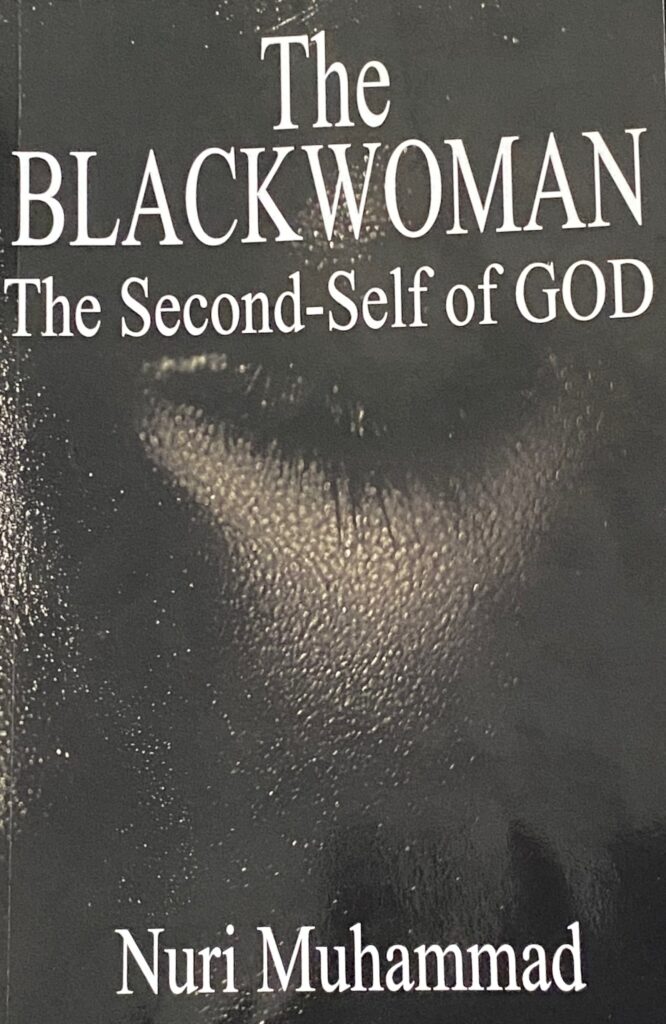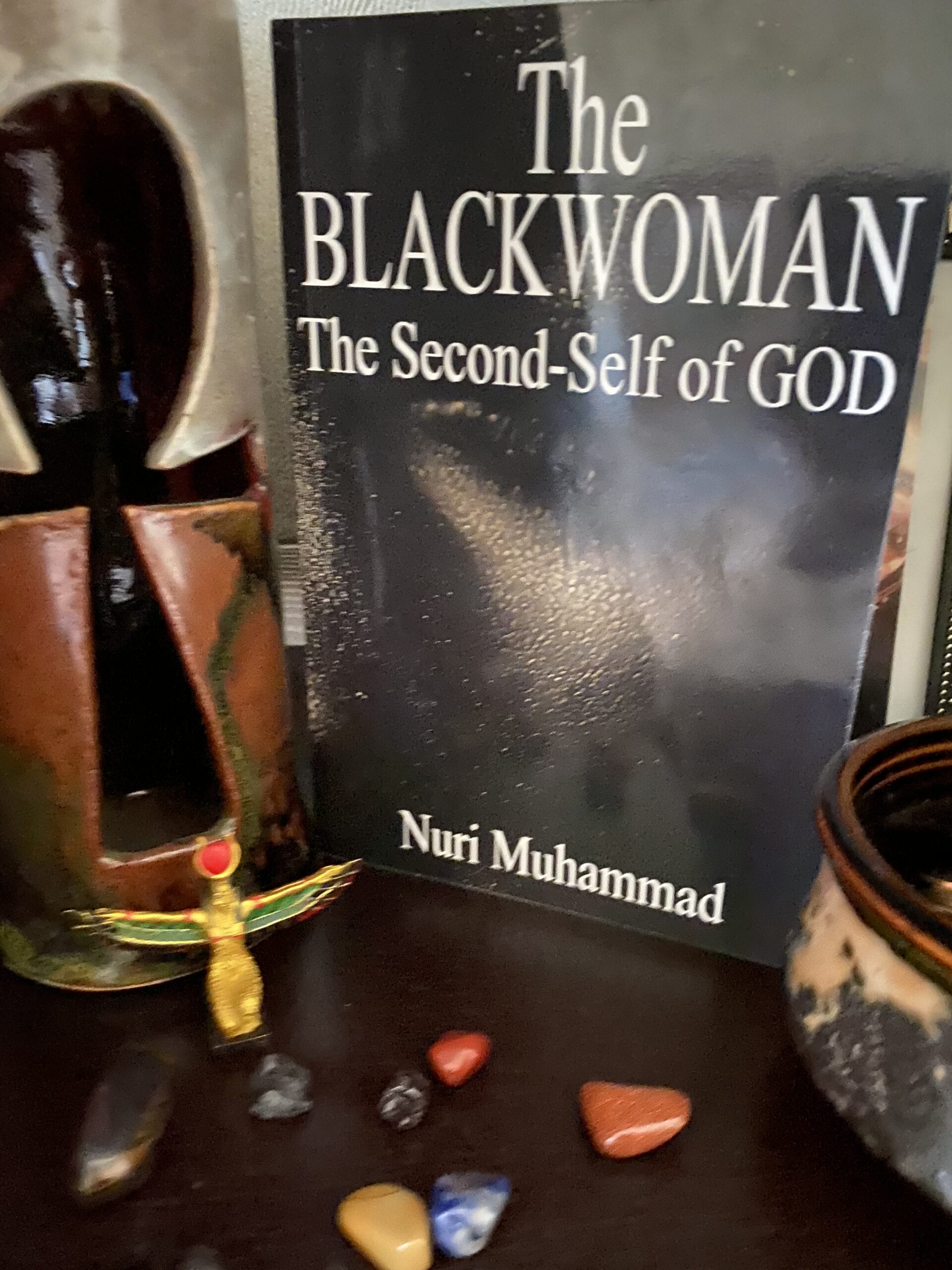“The wicked of this world see the Black woman as object of pleasure and perverse admiration mixed with toxic disdain,” but in this contemporary book by Brother Nuri Muhammad, a student of the Most Honorable Elijah Muhammad, takes an in-depth look into Proverbs 31 which explains how a king should reign and the attributes of an ideal (Black) woman, one who is treasured more than rubies.
I was curious to read this book after watching an interview that Brother Nuri participated in on the Breakfast Club. I am laxly aware of the Nation of Islam and its teachings, mostly through reading texts and watching documentaries/movies that were mostly about Malcolm X, whose photo hung in my childhood home. I credit his influence and my parents’ early activism for the reason why I don’t eat pork or shellfish. After watching the interview, and as I continue my own learning and awakening, I decided to purchase Nuri’s book, The Black Woman: The Second-Self of God, which was $15 on Amazon. It was a quick read, exactly 100 pages, which I finished in two afternoons.
Despite the religious undertone, I found this text to be quite empowering, as it discussed the qualities of a woman who, unwavering and intuitively, knows her worth. As perfection does not exist, she still lives a life of purpose, diligence, forgiveness and repentance – all values that I uphold in my own life of spirituality. I’m not familiar with biblical texts so I had to look up interpretations of the verse that Brother Nuri’s book focused on. In accordance with this article I found online about Proverbs 31, this woman lives a life of higher consciousness and balance, is faithful and loyal, a nurturing leader, looks after her mental, physical and spiritual well-being, willingly serves others with love and kindness, is wise and instinctive, shares her innate gifts and is diligent, and allows her god-like light to shine because of the knowing of the natural beauty of her soul.
My favorite quote from Second-Self of God reads, “A woman’s heart should be so lost in God, that a man has to find Him to get her.” I shared this with someone I have a deep relationship with and he agreed ecstatically, “Yes!” I interpreted this line as, you should be so lost in your Self, your divine purpose and growth that a man has to seek that same determination and essence of divinity within himself to be able to match your vibration, forcing him to level up to even think that he deserves you – a woman of immeasurable value and wish fulfillment. If we are sacrificing our Self unnecessarily and merely tolerating, then we are not allowing pure love to flow freely through the relationship, we are discounting ourselves… for what? For whom?
“A woman’s heart should be so lost in God, that a man has to find Him to get her.”
-Nuri Muhammad
I appreciated that, as I understood this text, it was not of a patriarchal mindset. The woman, and specifically the Black woman, is to be revered; for, she is, in truth, the original creation and consequently the closest manifestation of God. For a child, she is the prime doctor and teacher.
This book also allowed me to reimagine what it meant for the woman to be “the rib” of a man. It explained that the rib protects the heart and lungs – the compassion and inspiration of a nation; it is right by his side, under the arm being protected as a co-creator of, essentially life and a community.
Other excerpts that stood out to me included: the woman needing to exist in an environment where she feels safe; and therefore, has the confidence to express her creative gifts, skills and talents. As I think of cultural appropriation, she should be recognized and celebrated for her distinctive artistic abilities, knowledge and contributions to the evolution of society. A man’s commitment to this woman acknowledges that he recognizes her supreme value and he provides the tools for her to nurture a home that allows him to go out every day and “fight in the enemy’s world” – the enemy being the systemic oppression and degradation of his humanity that he may face in his quest for worldly success. The text talked about “good air circulation” within the home, meaning the words spoken amongst the walls. The home should be a safe haven, a retreat that is filled with unconditional love. Hate, animosity and toxicity doesn’t breed the energy needed to create a life of liberation and exaltation. The home is a spiritual recharge center to extract peace and power, not further harm.
Spiritual clarity requires mental and physical health, taking care of the bodily temple – which is why exercise and diet are important; Cleansing our bodies from toxicity as much as possible. That, too, is self and communal love. That is why we must address issues such as food deserts and choice, and over-indulgence or reliance on substances such as alcohol, because it affects the ability to ascend, and ascend into a rightful place of god-consciousness. “Every soul has two unseen forces – one inclining good, and the other opposing.” This text encourages seeking refuge through prayer and meditation to find patience, stillness, and ultimately, understanding so that we may remove and overpower the negative forces that aim to keep us hindered. Urges are voices within us that sound like truth but speak from the brain (and not the heart) and trauma to produce thoughts that rationalize deceptive “intelligence” to justify disobedience to our spirit. This is why learning discipline is imperative – not to be controlled, but to be in control.

“Everything that has value has some difficulty factor attached to it; the greater the value the greater the pain involved. Pain is the mother of all growth. The “devil” entices with comfort and becomes a habitual pattern of deviation from Spirit/authenticity.” Mental clarity allows us to see the difference and to make sounder decisions. When you understand your value, you do not chase; you wrap yourself in the warmth of heavenly love and remain patient in your dignity, enduring on a path of deserving goals and not unnecessary distractions.
The Black Woman: The Second-Self of God outlined steps in the process for a woman to stay true to her God-like nature. These steps were: a vow of unconditional love, to seek knowledge on her own, spend time and learn to be with her Self, not to be consumed by worldly pursuits, conversations or behavior, and to practice patience. Yes, because this is written from a religious perspective, there were also comments on how to dress in a way that honors self-respect (but that is subjective), and that a relationship is of a man and woman – but for the sake of my own beliefs, I interpreted that as a balance of masculine (male) and feminine (female) energies which is important within any relationship, but not restrictive to sex/gender. That’s a whole other topic, though.
This book reminded me that, “The only permanent relationship we have is with God (with ourselves) – a husband (or any person/physical being, for that matter) can die, but God (the spirit, the energy) is always alive.” Another powerful statement that offered great reflection to me was, “We have been controlled by a diameter of thinking that is inferior to the circumference of activity we need to get where we are striving to ascend.” Here, I thought about the distorted educational system and overall lack of critical thinking skills that most people possess. “By nature, we are righteous; by circumstance, we bow down to man.” Systemic and institutional racism, sexism and other –isms created by man-made social power structures attempt to inhibit the uprising and manifestation of a rightful expression of divine prowess. “We cannot fall in love, God is love.” Love is a state of being, not something to be attained outside of ourselves, it becomes who you are. You can give love if you are love because then you know love. If not, it is only a constructed idea that you have to force to exist; it is inauthentic and not given freely and cannot be sustained in a stable manner.
Love is healing and comforting. Love does not interact with another by the way he behaves, but by the way you know that individual to be internally. Love is sincere, it is uplifting (especially to the esteem); it is kind, encouraging and self-motivating. Love does not require obligation, but freedom and balance. Love is vivacious and soul-stirring; it is accepting. Love is absolute.
Notwithstanding if I am religious or not, or Muslim or not, I found this reading to hold valuable information about love for Self and how to share that love with others. Even though this text was written by a man and basically detailed how a woman should carry herself, being a Black woman, it was endearing to read a perspective that upheld Black women as sacred individuals that are worthy of devotional and unparalleled protection, and seen as the pillars and true leaders of the community. In the relationship that I am fostering, it gave me a sense of greater understanding of the growth I have experienced, and a blueprint to adapt as I represent my counterpart. It flamed the fire within to assert and be devoted to my powerful purpose on this earth, unabashedly; and, reconfirmed my knowledge of Self. As the first chapter began with the recognition that this text is necessary because of the fetishization and devaluation of Black women, I feel it can also resonate with other women of color, and I have gifted a copy to a Latina friend of mine who, after discussing it with her, was also interested in indulging in these written words.

In the Editor’s Note, it read: “In the Garden of the Beloved there are many flowers of varying sizes and colors. Producing different aromas, which gently fill the air like jasmine, honeysuckle and rose on Spring days. In the Garden of the Beloved, every flower has a purpose and none fails to bloom. In the Garden of the Beloved, no matter the season, the Master Gardner attends to each flower according to its need. In the Garden of the Beloved, uniqueness is celebrated. The Beloved is Allah (God), His Garden is the Universe and the array of flowers is the Black woman of varying sizes, shapes and hues. Some with thorns, some without. Some so delicate they can barely stand to be touched, while others are strong and sturdy. In the Garden of the Beloved every flower is loved, and she knows it.”
